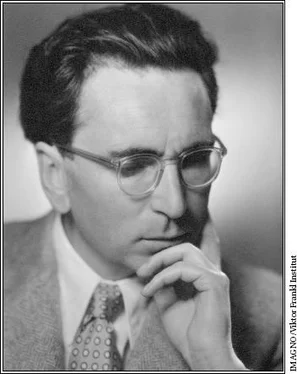The body has fewer inhibitions than the mind. It made good use of the new freedom from the first moment on. It began to eat ravenously, for hours and days, even half the night. It is amazing what quantities one can eat. And when one of the prisoners was invited out by a friendly farmer in the neighborhood, he ate and ate and then drank coffee, which loosened his tongue, and he then began to talk, often for hours. The pressure which had been on his mind for years was released at last. Hearing him talk, one got the impression that he had to talk, that his desire to speak was irresistible. I have known people who have been under heavy pressure only for a short time (for example, through a cross-examination by the Gestapo) to have similar reactions. Many days passed, until not only the tongue was loosened, but something within oneself as well; then feeling suddenly broke through the strange fetters which had restrained it.
One day, a few days after the liberation, I walked through the country past flowering meadows, for miles and miles, toward the market town near the camp. Larks rose to the sky and I could hear their joyous song. There was no one to be seen for miles around; there was nothing but the wide earth and sky and the larks’ jubilation and the freedom of space. I stopped, looked around, and up to the sky—and then I went down on my knees. At that moment there was very little I knew of myself or of the world—I had but one sentence in mind—always the same: “I called to the Lord from my narrow prison and He answered me in the freedom of space.”
How long I knelt there and repeated this sentence memory can no longer recall. But I know that on that day, in that hour, my new life started. Step for step I progressed, until I again became a human being.
The way that led from the acute mental tension of the last days in camp (from that war of nerves to mental peace) was certainly not free from obstacles. It would be an error to think that a liberated prisoner was not in need of spiritual care any more. We have to consider that a man who has been under such enormous mental pressure for such a long time is naturally in some danger after his liberation, especially since the pressure was released quite suddenly. This danger (in the sense of psychological hygiene) is the psychological counterpart of the bends. Just as the physical health of the caisson worker would be endangered if he left his diver’s chamber suddenly (where he is under enormous atmospheric pressure), so the man who has suddenly been liberated from mental pressure can suffer damage to his moral and spiritual health.
During this psychological phase one observed that people with natures of a more primitive kind could not escape the influences of the brutality which had surrounded them in camp life. Now, being free, they thought they could use their freedom licentiously and ruthlessly. The only thing that had changed for them was that they were now the oppressors instead of the oppressed. They became instigators, not objects, of willful force and injustice. They justified their behavior by their own terrible experiences. This was often revealed in apparently insignificant events. A friend was walking across a field with me toward the camp when suddenly we came to a field of green crops. Automatically, I avoided it, but he drew his arm through mine and dragged me through it. I stammered something about not treading down the young crops. He became annoyed, gave me an angry look and shouted, “You don’t say! And hasn’t enough been taken from us? My wife and child have been gassed—not to mention everything else—and you would forbid me to tread on a few stalks of oats!”
Only slowly could these men be guided back to the commonplace truth that no one has the right to do wrong, not even if wrong has been done to them. We had to strive to lead them back to this truth, or the consequences would have been much worse than the loss of a few thousand stalks of oats. I can still see the prisoner who rolled up his shirt sleeves, thrust his right hand under my nose and shouted, “May this hand be cut off if I don’t stain it with blood on the day when I get home!” I want to emphasize that the man who said these words was not a bad fellow. He had been the best of comrades in camp and afterwards.
Apart from the moral deformity resulting from the sudden release of mental pressure, there were two other fundamental experiences which threatened to damage the character of the liberated prisoner: bitterness and disillusionment when he returned to his former life.
Bitterness was caused by a number of things he came up against in his former home town. When, on his return, a man found that in many places he was met only with a shrug of the shoulders and with hackneyed phrases, he tended to become bitter and to ask himself why he had gone through all that he had. When he heard the same phrases nearly everywhere—“We did not know about it,” and “We, too, have suffered,” then he asked himself, have they really nothing better to say to me?
The experience of disillusionment is different. Here it was not one’s fellow man (whose superficiality and lack of feeling was so disgusting that one finally felt like creeping into a hole and neither hearing nor seeing human beings any more) but fate itself which seemed so cruel. A man who for years had thought he had reached the absolute limit of all possible suffering now found that suffering has no limits, and that he could suffer still more, and still more intensely.
When we spoke about attempts to give a man in camp mental courage, we said that he had to be shown something to look forward to in the future. He had to be reminded that life still waited for him, that a human being waited for his return. But after liberation? There were some men who found that no one awaited them. Woe to him who found that the person whose memory alone had given him courage in camp did not exist any more! Woe to him who, when the day of his dreams finally came, found it so different from all he had longed for! Perhaps he boarded a trolley, traveled out to the home which he had seen for years in his mind, and only in his mind, and pressed the bell, just as he has longed to do in thousands of dreams, only to find that the person who should open the door was not there, and would never be there again.
We all said to each other in camp that there could be no earthly happiness which could compensate for all we had suffered. We were not hoping for happiness—it was not that which gave us courage and gave meaning to our suffering, our sacrifices and our dying. And yet we were not prepared for unhappiness. This disillusionment, which awaited not a small number of prisoners, was an experience which these men have found very hard to get over and which, for a psychiatrist, is also very diffcult to help them overcome. But this must not be a discouragement to him; on the contrary, it should provide an added stimulus.
But for every one of the liberated prisoners, the day comes when, looking back on his camp experiences, he can no longer understand how he endured it all. As the day of his liberation eventually came, when everything seemed to him like a beautiful dream, so also the day comes when all his camp experiences seem to him nothing but a nightmare.
The crowning experience of all, for the homecoming man, is the wonderful feeling that, after all he has suffered, there is nothing he need fear any more—except his God.
1. An interesting incident with reference to this SS commander is in regard to the attitude toward him of some of his Jewish prisoners. At the end of the war when the American troops liberated the prisoners from our camp, three young Hungarian Jews hid this commander in the Bavarian woods. Then they went to the commandant of the American Forces who was very eager to capture this SS commander and they said they would tell him where he was but only under certain conditions: the American commander must promise that absolutely no harm would come to this man. After a while, the American offcer finally promised these young Jews that the SS commander when taken into captivity would be kept safe from harm. Not only did the American offcer keep his promise but, as a matter of fact, the former SS commander of this concentration camp was in a sense restored to his command, for he supervised the collection of clothing among the nearby Bavarian villages, and its distribution to all of us who at that time still wore the clothes we had inherited from other inmates of Camp Auschwitz who were not as fortunate as we, having been sent to the gas chamber immediately upon their arrival at the railway station.
Читать дальше












